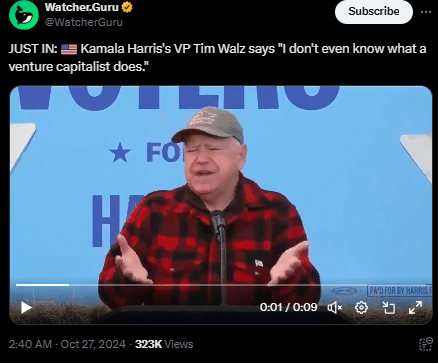Minnesota Governor and Kamala Harris’s Vice President Tim Walz admitted, “I don’t even know what a venture capitalist does.” Critics wonder how leaders who lack private sector experience will tackle complex economic reforms and develop cryptocurrency regulations that drive growth while ensuring security.
Will Walz and Harris take an active part in strengthening the country’s economy, or will they dance to the tune of their campaign donors and form policies that are biased towards a select few corporations?
Harris, known for her extensive career in public service, once said, “For my entire career, I’ve only had one client: the people.” This commitment, while admirable to some, also means she has largely lived on taxpayer funding, rising through the ranks as district attorney, California attorney general, senator, and now vice president.

Her political path was steady, bolstered by high-profile connections, including an early association with former California Assembly Speaker Willie Brown.
In contrast, Republican leaders like Donald Trump and Senator J.D. Vance have extensive private-sector experience. Trump graduated from the Wharton School of Finance, expanding his family’s real estate business and building a global brand.
Vance, meanwhile, rose from poverty, served in the Marine Corps, and became a successful venture capitalist. Notably, Vance has backed crypto-friendly policies, co-sponsoring legislation to prevent banks from dropping “disfavored” industries like digital currency.
Critics argue that Harris and Walz’s limited private-sector exposure could impact their economic policy effectiveness. Their track record leans heavily on government expansion, such as Harris’s decisive vote on the 2022 Inflation Reduction Act, which added $324 billion in taxes over a decade.
As debates heat up, voters question if the pair’s backgrounds will help or hinder policies that spur real economic growth.
Also Read: Trump’s Win Threatens Memecoins under its Regulatory Sanity








